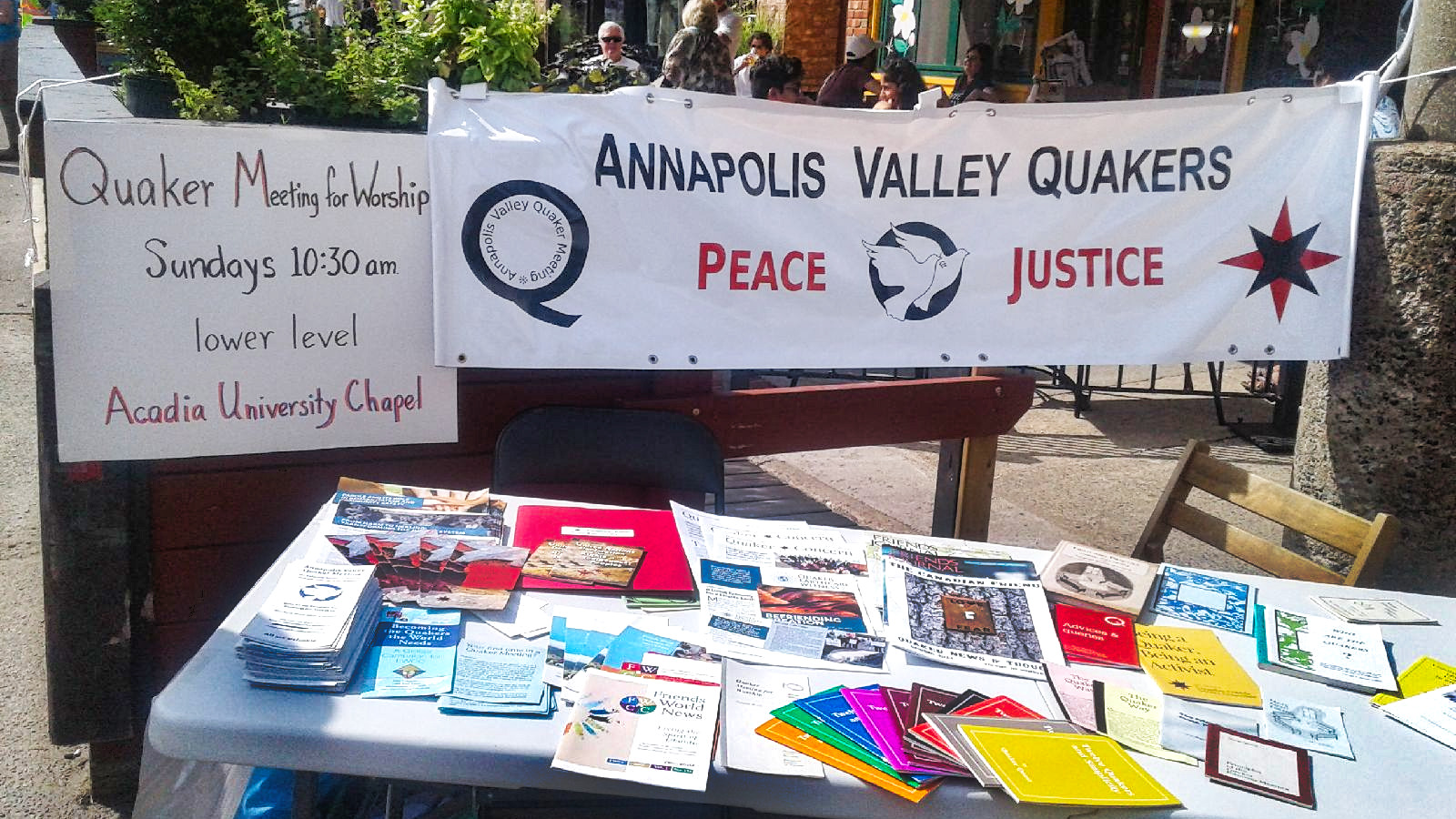 Wolfville and Acadia University are now collaborating on orienting newcomers to the community by having a “Welcome to Wolfville Street Party”. We had a table and invited many to come join us on Sunday mornings at the chapel basement.
Wolfville and Acadia University are now collaborating on orienting newcomers to the community by having a “Welcome to Wolfville Street Party”. We had a table and invited many to come join us on Sunday mornings at the chapel basement.
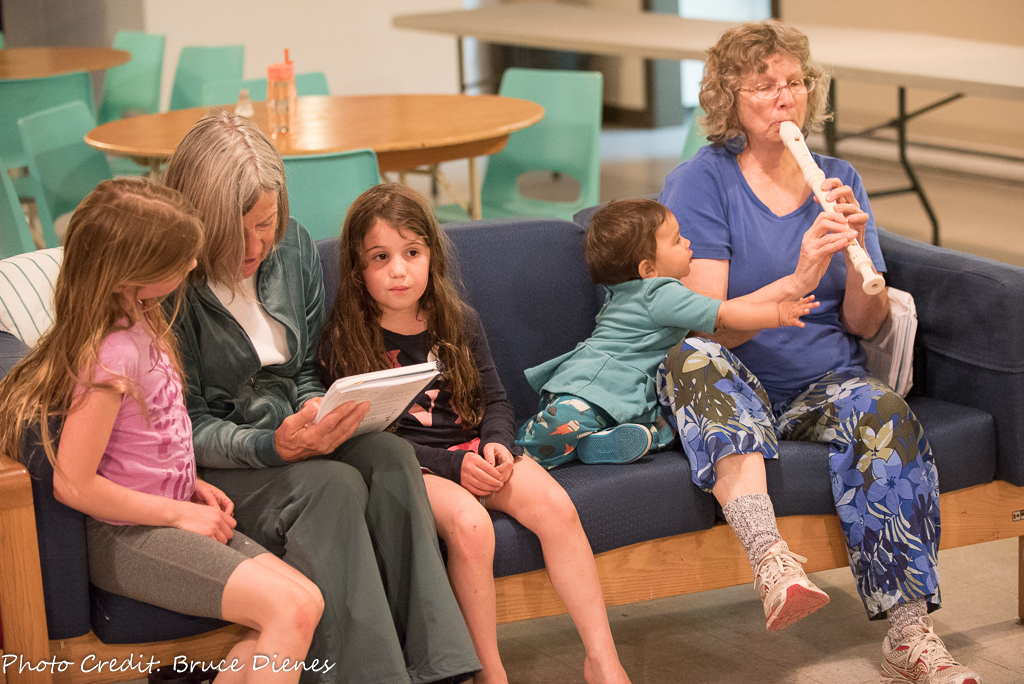
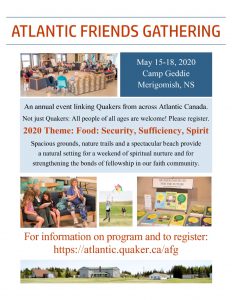
A Weekend of Enjoyment and Spiritual Renewal for All Ages! Enquirers are Welcome to Attend!
- Note: Atlantic Friends Gathering for May 2020 was cancelled due to Covid 19 emergency.
- We welcome members and attenders from our Atlantic Friends Monthly Meetings, Allowed Meetings, and Worship Groups, as well as guests. We have arranged a full program, including six guest presenters and a panel, a time slot for Special Interest Groups (SIGs), a Youth Program, and more. Atlantic Half-Yearly Meeting for Business will also be held.
-
The programmed sessions are interspersed with meal breaks, stretch breaks, and longer periods of free time. Enjoy sessions at your own choice, as well as your own communing with Friends and nature.
On Saturday evening, we hold “Meeting for Readings,” when Friends can share passages of writing that have inspired them. On Sunday evening, we feature “Family Night,” a cheerful talent show of music and other performing gifts by young and old.
Please feel free to enjoy the weekend in your own way!
PROGRAM
Presenters – a new program will be designed for May 2021.
Special Interest Groups (SIGs)
A 45-minute time-slot is available on Sunday morning for SIGs. Friends wishing to take advantage of this time to present information or carry out an activity on their “pet subject” should include details in the Comments box of the registration form. Note that the SIGs will run concurrently. Spaces for SIGs will be negotiated at AFG.
Display tables
Some tables will be available for Friends to set up displays. Please indicate your interest in the Comments box of the registration form. Note that room space is limited, so please be prepared to squish into half a table if necessary. Tables will be assigned on site.
Other highlights
- Meeting for Readings
- Family Night
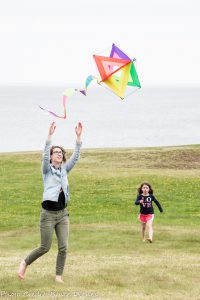 Youth Program
Youth Program
Youth Coordinator:
Assistant Youth Coordinator:
The Youth Program will have something for children of all ages, offering fun, age-appropriate activities that will include learning about Quakers. Parents, let us know your children’s ages and the choices of activities they might like, so that we can plan for them. Possible activities: Nature walks, crafts, outdoor games, drama – and much more. Would you like to be added to the list of volunteers, especially for younger children? We welcome your assistance for an hour or two during the weekend with the Youth Program. Please indicate your willingness to volunteer in the Comment section of the registration form.

Saturday March 7 & Sunday March 8, 2020
441 Canard Street, Lower Canard, NS.
(opposite Wellington Dyke Road)
Watch the film ”Modified” Share discussion of issues of GMO foods!
Workshop: Learn principles of plant-based diet and cooking!
Presented by the Annapolis Valley Quakers.
Saturday March 7 (Optional. No charge.)
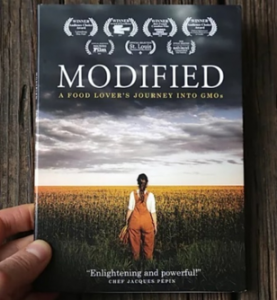 7.00pm – 8:30pm Film screening:
7.00pm – 8:30pm Film screening:
“Modified – a Food Lover’s Journey into GMO’s”
(GMO = genetically modified organism)
Filmed in Annapolis Valley; directed by Aube Giroux
8:30pm – 9:00pm Discussion
9:00pm Social time
Sunday March 8 (Daylight Savings Time)
 10:00am – 11:20am Quaker Meeting for Worship
10:00am – 11:20am Quaker Meeting for Worship
(Optional – click for details.)
11:30am – 4:00pm WORKSHOP
“Food – Nourishment for Body and Soul”
Cost (for food): $15.00
A presentation/demonstration by Bronwen Jones (of Plant Power) & Judy Wilmot. Prepare together, then savour, a variety of easy-to-make dishes for lunch while learning principles of plant-based diet and cooking.
4:00pm – 5:00pm Debrief / tea / closing
We held Quaker study sessions on the theme of Building Trust. The inspiration comes from a workshop Mylene attended at Pendle Hill, called Building Organizational Trust: Working With and Through Others. They had the pleasure of learning from facilitator Clinton Pettus, who presented many interesting ideas as well as a well-crafted process.
In presenting what they had learned at the workshop, they repeated some of the questions and exercises Pettus used. Interesting discussions arose around these:
- In what situations is trust important to you?
- What are some examples of people you trust, and why?
- What are some examples of organizations you trust, and why?
- What are some examples of social organizations you trust, and why?
Some of the techniques for building trust that they took from the workshop were
- Learn to observe others’ actions without assuming their motivations
- Support people in the way they want to be supported, not the way I want to support them
- Attend to emotions, needs, and values before ideas, interpretations, and action
Have you tried these techniques? How did they work? What techniques do you use for building trust?
The report Mylene wrote about their learning gives more details, why they sought it out in the first place, and how they’ve incorporated it over the year since then.
Thank God Somebody Finally Heard Me: Some Ideas on Building Trust
Why “feeling heard” can help build organizational trust, mediate conflict, improve mental health, promote learning, and save the world… with specific ideas about how to do it
Feel free to use the comments to share your thoughts about the questions above, the report itself, or wherever else this topic takes you.

Marchers with a placard reading in part “we must consciously work”, from an AFSC article “A Letter to my White Sisters After the Women’s March”
Last Saturday, we met for Quaker Study on the topic of Equality. Penni hosted, and prepared some food for thought in the form of quotes and queries.
American Friends Service Committee, the US-based Quaker service organization, publishes a booklet called “An Introduction to Quaker Testimonies.” From it, we considered these queries:
- How do I respond to opportunities to establish personal and professional relationships with people whose backgrounds differ from mine, whether across class, race, ethnicity, nationality, religion, age, gender, sexual orientation, or ability?
- In what ways do I work to change society so that everyone has equal opportunities?
- How can I speak up and take action in a loving way when I see and hear injustices?
- How do I “speak truth to power” in ways that honor the human dignity of people on all sides of an issue?
The conversation was informal and thoughtful, ranging over everything from the inherent rights of the Earth to whether socialist concepts can guide us toward equality. Many people contributed ideas from their own spiritual understanding.
Stay tuned for the next Quaker Study (they are scheduled roughly once a month) and consider joining us!
Greetings to folks associated with Annapolis Valley Monthly Meeting:
It does take money to run a Quaker Meeting! If you would like to donate, we would be happy to have a cheque made out to Annapolis Valley Monthly Meeting, or cash. You can drop these off at Meeting for Worship on any Sunday. Or, please contact our Treasurer at info@annapolisvalley,quaker.ca if you are not likely to be attending Meeting in the near future, and we will make arrangements to receive it — with many thanks!
You can also donate on-line via CanadaHelps.
Receipts for income tax charitable donations will be sent in February, so please make sure to include your mailing address.
We have had increased attendance this year at our Meetings for Worship and our special events. We share in the costs of using a space in Canard once per month. We continue to support Canadian Yearly Meeting, and the local Food Bank, and to invest in resources such as Friends Journal, a respected Quaker magazine. (Please let us know if you would like to borrow copies — the articles are interesting and useful for folks exploring modern Quakerism.) We support members and attenders in travelling to national and international gatherings, such as Canadian Yearly Meeting and Young Friends Gathering, Friends General Conference, and, this year, Britain Yearly Meeting. You can see a story from those travels on our Facebook page.
The Meeting thanks you for your support. If you have any questions or would like to contact us for any reason, please don’t hesitate to contact us.
Barbara Aikman, Clerk, and Marilyn Manzer, Treasurer

 Annapolis Valley Quaker Meeting hosted a full-day free workshop on Penal Abolition. Quakers Fostering Justice (QFJ), a branch of Canadian Friends Service Committee, offered this workshop across Canada.
Annapolis Valley Quaker Meeting hosted a full-day free workshop on Penal Abolition. Quakers Fostering Justice (QFJ), a branch of Canadian Friends Service Committee, offered this workshop across Canada.
Why is our criminal justice system based on punishment?
Why do we harm people when we could be healing them?
“Never forget that justice is what love looks like in public.” – Cornel West
What is Penal Abolition?
Penal abolition seeks to shift from punishment to justice that is restorative, transformative and healing – for victims, perpetrators, and society. It is not only about prisons; penal abolition seeks to eliminate the punitive mindset which pervades all of society, by transforming harmful approaches to ones that are healing.
Read more in QFJ’s flier From Harm to Healing: Transforming the Justice System
How Does This Relate to Nova Scotia?
To learn more about conditions for those incarcerated in Nova Scotia, here are some resources. Please note that these describe experiences of violence and abuse.
Solitary confinement, costs of phone calls, and effects on mental health (El Jones, Halifax Examiner)
Rights don’t stop at prison walls (Anne Farries, The Guardian)
Agenda
- Use videos, discussions, and small-group exercises to learn about QFJ’s work on penal abolition
- Explore alternatives to punishment
- Learn about the Truth and Reconciliation Commission’s Calls to Action for justice work
- Connect local people and organizations concerned about the need for change.
- Map our path to doing justice to ourselves, to faith-based and broader communities, and to our world.
You can read about a similar workshop that QFJ recently offered in Calgary.
Workshop Goals
- Define penal abolition
- Survey what’s happening in the justice system right now, and what’s working and not working
- Summarize the Truth and Reconciliation Commission’s Calls to Action and their impact on justice work
- Learn about alternatives to punishment
- Consider justice in our relationship with ourselves, our Quaker community, and beyond
Facilitators
Dick Cotterill is a member of Halifax Monthly Meeting and Quakers Fostering Justice. He also sits on the board of the Church Council on Justice and Corrections, is a member of the Canadian Criminal Justice Association, and volunteers in Truro with the John Howard Society.
David Summerhays is the clerk of Quakers Fostering Justice. He is a member of Montreal Monthly Meeting, and has participated in Circles of Support and Accountability’s restorative justice program for 5 years.

A member of Hartshill Meeting in the UK, dressed as Quaker founder George Fox.
Friend Carol Bradley visited with UK Quakers to attend Britain Yearly Meeting‘s annual gathering. She brought back photos and stories of her travels to locations that were significant in the life of early Quaker George Fox. Here are some of the things she saw and learned. Quotes are from George Fox’s journal.
She writes,
Hartshill Quakers organized a day out by charter bus for folks attending Britain Yearly Meeting. A young man from the Meeting, dressed as George Fox, read aloud from Fox’s journal in each place where the tour stopped. The Meeting provided a lovely lunch for 25. The folks at Drayton church receive frequent Quaker ‘pilgrims’ and were very hospitable, with tea and homemade ‘biscuits’. At Market Bosworth, we found the priest had not known the story of Fox being ejected from the church and was as entertained as we were.
Fenny Drayton: Where Fox was Born

Fenny Drayton Church
“ I was born in the month called July in the year 1624 at Drayton-in-the-Clay in Leicestershire. My father’s name was Christopher Fox; he was by profession a weaver, an honest man and there was a seed of God in him. The neighbours called him ‘a righteous christer’. My mother was an upright woman; her maiden name was Mary Lago, of the family of the Lagoes and of the stock of martyrs…”
Mancetter: “Despair and Temptation”
“…after this I went to another ancient priest at Mancetter in Warwickshire and reasoned with him about the ground of despair and temptations, but he was ignorant of my condition; and he bid me take tobacco and sing psalms. Tobacco was a thing I did not love and psalms I was not in an estate to sing, then he bid me come again and he would tell me many things, but when I came again he was angry and pettish, for my former words had displeased him. And he told my troubles and sorrows and griefs to his servents, so that it got among the milk lasses, which grieved me that I should open my mind to such a one.”
Atherstone: “Glory and Life Shined Over All”
“…from Coventry, I went to a place called Atherstone and when I was two miles off it the bell rang upon a market day for lecture, and it struck at my life, and I was moved to go to the steeplehouse, and when I came into it I found a man speaking and as I stood among the people the glory and life shined over all, and with it I was crowned, and when the priest had done I spoke to him and the people the truth and the light which let them see all that ever they had done, and of their teacher within them, and how the Lord had come to teach them himself, and of the seed of Christ in them; how they were to mind that, and the promise that was the seed of God within them, which is Christ.
And they were generally pretty quiet, only some few raged and it set them in a hurry and under a rage. Some said I was mad and spoke to my outward relations to tie me up. And I passed away in peace in the power of the Lord God, and the truth came over all and reached into the hearts of many people.”
Market Bosworth: “We Passed In the Truth of God”
“Then I was moved to go to Market Bosworth on market day. He that preached that day was Nathaniel Stephens, who was priest of the town where I was born. He raged much when I spoke to him and the people in the steeplehouse and yard of the truth and light within people to guide them to Christ from sin. And he told the people I was mad (though he said before there was never such a plant bred in England), and he bid the people they should not hear me, and the clerk bid us to go out of the steeplehouse, for he was to lock the door. When we were in the market place Friends asked where was the place to try the ministers but in the steeplehouse, and bid them to come forth and prove their call and ministry. But the people of the town and market fell upon us and stoned us very sore, and abused us, hundreds of them with stones, a great way out of the town, that it was a wonder we escaped with out lives, and so we passed away in the truth of God, to the shame of both priests and professors, for there were many there; and Friends had but little harm.”

Stairs leading to the second floor of Northampton Friends’ meeting space. Published in Friends Journal.
Quakers historically have no creed: we are not required to accept a formal set of beliefs. We do, however, recognize guidelines to the way we live our lives known as “testimonies.”
- In practical terms, what does living simply mean to you? How are you living the testimony to simplicity right now?
- What difference do you think the decision to live simply makes in terms of issues like environmental sustainability, peace, the priority you give to spiritual development, the quality of your family life, your own well-being?
How are Pride celebrations, which commemorate the anniversary of the Stonewall Rebellion, linked to Canada day, which marks the anniversary of the Constitution of 1867? They share an open secret: the state’s control of sexuality/gender and the state’s control of land are two of the cornerstones of colonization. And it’s no coincidence that the resistance movements they are connected to draw deeply from the leadership by Indigenous women, women of colour, and people whose genders don’t fit well in the binary model that is dominant today.

Photo of jia qing wilson-yang from Metonymy Press
In this interview, take a trip with award-winning, Quaker-influenced author jia qing wilson-yang as she exposes the connections between these ideas in her own life, offers suggestions for the path forward, and beautifully welcomes all of us to explore for ourselves.
As you read, here are some queries you might find fruitful. Does this article inspire other questions for you? Please leave them in the comments!
Queries
- What role has silence played in losing connection with my ancestors, or re-weaving that connection, or both?
- How, in my experience and for those around me, has sexuality and gender been used for colonization, or for liberation?
- How, if at all, do I experience the relationship between pacifism and profit-making?
- What works best when I am helping someone question long-standing beliefs? What have others done to help me question mine?
- What is my relationship to punishment and/or penal abolition, in relation to prisoners, people of colour, people with intellectual disabilities, children, and others?
- When have love and faith helped me participate in healing, and when have they become “internal noise” that prevents me from hearing someone whose experience is different from mine?
- How have faith communities related to state control of land, of gender, of sexuality? What is the role of today’s faith communities in moving that relationship towards justice?
Interview
“The biggest project of gender education that ever happened here is colonialism.”
That’s where the conversation ended up when I invited jia qing wilson-yang to talk with me about spiritual practice, sexuality, gender, and her experience growing up Quaker as a mixed-race trans woman.
It’s not where the conversation started. jia qing was in Wolfville, NS last fall for the launch of her book, Small Beauty, which recently won the 2017 Lambda Award for transgender fiction. She currently lives in Toronto, and her spiritual practice includes meditation, learning about Taoism, and pouring a cup of tea each morning for her ancestors. But as a child growing up outside of Hamilton, she attended Quaker Meetings and spent summers at Quaker-run Camp NeeKauNis.
My name is Mylène DiPenta. I grew up in Dartmouth, NS, a gender-unruly child in a white Catholic family where immigration was a living memory. Where jia qing moved toward the city, I moved away – to a village of 700 people in the Annapolis Valley. She drifted away from Quakerism; in my late 30s, I drifted toward it. Over three meals in October 2016, I interviewed her about connections between spiritual practice, gender, sexuality, and colonialism.
What was your experience with Quakerism like?
I remember going to Young Friends retreats at Friends House in Toronto. You’ll see it when you’re there – it looks big on the outside but it’s so much bigger on the inside. It was awesome to spend a whole weekend with your friends, run around, drink too much coffee. We had really rad Friendly Adult Presences [adults on hand who support youth retreats]. They were on board with whatever we wanted to do. [Their take on sex was] don’t have babies if you don’t want to, and be safe. We were given a long leash, as long as we cleaned up after themselves.
I wish we had more sex ed, good sex ed, consent[-based] sex ed. I found out about ways that that was lacking years later.
Youth retreats were great – we had them in Hamilton, at camp NeeKauNis, “a place for lost souls.” You definitely feel like you’re in a place where people have had [Quaker] Meetings for a long time. There’s a huge ironwood tree. Ironwood trees are not big, typically, and it has a huge hole in in, like it should be dead, but it’s not, and people have worship there.
I started going to camp when I was six. It was great, I loved it. It was the first time I spent time around a lot of kids. Obviously I went to school, but that sucked. The first few years, the whole family would go. As soon as I was old enough to be [hired as] staff, I was there every summer until I was 18 or 19. After that I went to the Thanksgiving retreat. Being there in the autumn was great, to look out on the bay. [It had that] intentional community feel that happens when you’re with a group of people [consistently over the years].
I could feel it in my body if I didn’t go [to Camp NeeKauNis] for a year… It wasn’t a sense of ownership, more of a sense of belonging. I need to go somewhere I belong.
I got to hang out with my friends, feel like I had a sense of independence. I could feel it in my body if I didn’t go for a year, I felt a little out of sorts. It wasn’t a sense of ownership, more of a sense of belonging. I need to go somewhere I belong. I needed that because I was a mixed-race kid in a mostly white town, and trans and queer, but those things were not things I was aware of at the time.
Did you incorporate your Quaker experiences in your novel?
I did write about the camp in the novel. Anyone who’s been there would know. The main character in the novel breaks into the boathouse and steals a canoe. I never did that! But I definitely thought about it.
What is your spiritual practice like now?
When I started telling the world I was trans and being open about who I like to sleep with, I wasn’t so much in [touch with Quakers.]
I went back to Quaker [Meeting occasionally] and it still felt like a really white space. That’s not something I need a lot of right now. Not that I don’t love Meeting. I was part of a queer people of colour meditation group in Toronto; that was really great. Having meditation with queer folks of colour – just to hold that space was fantastic. I really crave that silence. The silence is so ingrained in my routine, being comfortable with silence [when so many others aren’t.]
The story of George Fox … How was it that he decided to do something that most white people were not doing, but lots of Buddhists were?
The story of George Fox – it was always presented to me as, [direct revelation] just occurred to him one day. But was this idea floating around? How was it that he decided to do something that most white people were not doing, but lots of Buddhists were?
It was lovely [to realize] that there’s a tradition of silence that my mother [who is white] entered. My dad [who is Chinese] went to Jesuit school as a kid in Hong Kong and didn’t have that same connection to Buddhism. But seeing the similarities [between Buddhist and Quaker practices], knowing that that was how my chingbu [grandmother] understood herself, it was a nice surprise to find these things that brought together different parts of my life. I didn’t realize that until I was spending time meditating with other folks of colour. [These days I’m] learning more about Taoism.
When I’m at home, every morning I make tea, pour a cup for my ancestors… ask for their watchful eye to continue. I try and feel [their] presence.
When I’m at home, every morning I make tea, pour a cup for my ancestors, light incense, pray to a small altar I made with their names written up and things that remind me of them, give thanks, ask for their watchful eye to continue. I try and feel some kind of presence that I don’t necessarily attribute to a god or a higher being, but more about ancestors. That feels genuine right now. My chingbu is buried in North York; I clean [her grave], light incense, leave papaya. My dad doesn’t remember tons about traditional Chinese worship, so I feel like I’m learning.
Reweaving that connection to your ancestors brings us to the connections between colonialism and spirituality. Do you want to say a bit about that?
As I’ve been learning more about ancestor worship, I’m also thinking about how my white family is implicated in colonisation. That’s just a natural connection. Who are these people I’m worshiping? Why am I paying respect to them? It’s never been a question, that that’s what I should do. But, what did we do?
Who are these [ancestors] I’m worshiping? … It’s never been a question, that that’s what I should do. But, what did we do?
My grandmother[‘s family] came into Canada as Loyalists. They settled in Brantford, 7 or 8 generations ago, right beside Six Nations, the largest reserve in Canada, one of the largest residential schools in Canada. This is on my family[‘s heads]. They were Anglicans in Brantford. Even if they weren’t working at the school, because it was run by the Anglicans and Brantford isn’t that big, I refuse to believe that we’re not implicated. Brantford and other nearby towns have a long history of encroaching on the reserve.
[The needed] healing work has to be about spiritual practice. My partner is mixed Indigenous. We had a marriage ceremony a year ago, we’ve been together 8 years, I feel very committed to her. This person I have a great deal of love for in a very complex way, has been really negatively impacted by colonization, while my family has definitely benefited [from it] and played a role.
The times that I spent a lot of time in activist communities, most of my 20s in different cities, around a lot of anarchists, something that I always felt was lacking in our organizing was faith or love or something really positive. There’s so much anger. Justifiable anger makes a lot of sense to me; anger can be so useful as an emotion, [but it] can be toxic when not balanced — it can eat you. I’m trying to conceptualize the work that we’re doing as part of a larger healing process.
Sex and gender injustice are a big part of how colonizing gets done. What are your thoughts about that?
Targeting a gender system is a way to destabilize a society. So if we’re going to talk about gender in Canada, that means “Decolonizing transgender 101.” The biggest project of gender education that ever happened here was colonialism.
When we think about settler colonialism – Gord Hill, [a member of Kwakwaka’wakw Nation] from Vancouver, gave a great presentation. [He talked about the] brutal history of settlers, Spanish colonizers coming into California. Anything that looked like 2 men having sex, anything that is read as a transgression against masculinity is really violently punished. This is documented in paintings. They see people they’re calling “joyas,” [who they think are] men in female dress in relationships with other men. But they’re actually other genders that are maybe neither male or female. There are many different words used to describe those genders/practises, depending on what nation they’re part of.
…we talk about North America as this hub [of progressiveness but] now the Asia Pacific Transgender Network uses standards of health from the [US-based] World Professional Association for Transgender Health. Targeting [another culture’s] gender system is a way to destabilize a society.
So often when we’re talking about trans identities, we talk about North America as this hub [of progressiveness]. All of the words we use – trans and non-binary, are still [rooted in European ways of thinking.] Now the Asia Pacific Transgender Network uses standards of health from the World Professional Association for Transgender Health [WPATH – which is US-based and rooted in Euro-Western scholarship] to do education about trans identities in Nepal and the Philippines and Pakistan.
And we can trace it back to a boom in population in England around the time when industrialization is happening – capitalism is taking off – [because the authorities have criminalized sex that isn’t procreative.]
For Chinese folks, because of Confucius, there’s been patriarchy and a binary gender system for thousands of years. There are some small references to people born as boys raised as women to perform wu shamanistic functions, but that was thousands of years ago. Bringing that together for myself, it’s about being on the land, and thinking about what it means to be descended from the people I am. I begrudgingly don’t have another lens through which to look at it. I would love it if I did but it wouldn’t be mine.
I identify as a gay lady; I feel great about it. It feels right. I have deep respect for other trans women … that’s where I am. Such massive deep respect for older trans women. How did you survive? What kinds things did you do? That’s amazing to me.
It could only happen in a context of colonization that I could be meeting all of these trans women. We’re sort of mashed in together because they don’t have words for us. It’s usually problematic, but it does bring together people who have a shared experience because they’re punished by patriarchy in a very particular way. Shared experience can be grounding.
What started you on the political path you’re on?
I grew up in a [Quaker] Meeting! I had an amazing Sunday school leader – Helen Brink, who recently passed away. She would bring in articles for conversation about disarmament, environmental issues, get us thinking about social justice. I was 10 at the oldest when I remember really taking that to heart, that being a big thing. Then I was going to rallies and peace marches as a teenager because the Iraq war was happening, going to school in Guelph, getting involved in anti-capitalist organizing on campus. That’s when I started to think about violence differently – people think that being a pacifist means being against physical violence, but I was starting to think about structural violence, about poverty as a kind of violence. And thinking about decolonization and self-determination. I went to a conference in Montreal, called Land, Self Determination, and Decolonization. There were Indigenous speakers from across the country, talking about the Gustafsen Lake standoff [on Secwecmec/Shuswap territory]. They didn’t want it to be an armed conflict but felt it was necessary. I listened to Mohawk speakers talk about the Oka crisis.
[Quaker] Sunday school [got] us thinking about social justice.
I was hearing these things that seemed almost unbelievable about Canada, based on what I knew.
I was supporting Grassy Narrows through the Rainforest Action Network, trying to raise money. There were a lot of people organizing around Indigenous Peoples Solidarity Network. I helped work on a land reclamation project at Caledonia. I was listening to old Six Nations folks tell stories at night about the pass system on the reserve – what I now know as Indian Act Policies.
What inspired to you write a novel?
I wanted to be a writer since I was a small kid. Some friends started a small press and put out a call for manuscripts. I had a bunch of little bits of writing floating around on my computer. I thought they could come together into one story that was never finished. They said yes – finish writing it.
As a kid, it spoke to me because you could just make everything up. That’s awesome. I loved reading., and I spent a lot of time alone. I was always imagining worlds and scenarios and fights.
What’s your next writing project?
Another book is slowly emerging. I really want to think about responsible ways for settlers to be writing about colonization. I want to talk about prisons. Lots of people I love a lot have been inside at different points. A close friend was jailed for a year, and I would visit her. It wasn’t the first time I did prison support for her but it was the longest she was put away.
So many of the trans people I know have been in jail – they get arrested for sex work or possession.
I really want to think about responsible ways for settlers to be writing about colonization. I want to talk about prisons. So many of the trans people I know have been in jail…
There’s a course on Women, Criminalization and Madness at the Vanier Center for Women [a prison in Ontario]. The students are half social work students and half inmates. Everyone gets the same university credit. This was really problematic but I learned so much. One of the correction officers gave us a tour of the prison. We’re in someone’s personal space, they don’t have a choice, it feels very invasive, but it means I saw the whole prison. The “yard” for maximum security is a concrete room that has a thick mesh razor wire. A concrete room with no ceiling. This isn’t one of the “Supermax” facilities, it’s one of the smaller ones. We walked past the solitary, that’s where trans people go. In Ontario if you haven’t had bottom surgery, I asked a correction officer what happens. You can go to a women’s prison, but you go to solitary. It’s terrifying, inhumane.
I was working with lesbian, gay, bisexual, and trans youth with intellectual disabilities. Three institutions in Ontario were used as asylums for people with intellectual disabilities. Very much a prison kind of institution. They’re also laid out in ways similar to residential schools. Kids were dropped off when they were 2, 4… and stayed their whole lives or into their 20s. There’s a laundry list of horrible abuses. The prison, while physically very different, had similar problems. The correctional officers were complaining that there was no air conditioning… which is true, but you’re going home.
Going there and touring that institution… Lots of those youth I worked with, had circumstances been slightly different, could have ended up there. Working with adults who were survivors, doing a lot of soul-building kind of work, walking through that institution, it was awful. Being there, being able to walk through it – the gravity of it was so different.
What’s the education work you’re doing now?
[At the time of this interview, I was working as the Training and Education Facilitator at Rainbow Health Ontario. Unfortunately, very recently I’ve had to leave that position to prioritize finishing my degree. ]
I was excited to get to work in a more focused way on education. I was interested in working on ideas of transmisogyny, colonization, racism, having those ideas sink in.
…you don’t need to understand something to respect it. I don’t expect that in our day long workshop [about queer and trans issues], a group of people who haven’t considered racism and gender are going to develop this in depth analysis… My job is to make sure they give safe and responsible care to trans and gender nonconforming people.
In the trainings we do, we emphasize that you don’t need to understand something to respect it. I don’t expect that in our day long workshop, a group of people who haven’t considered racism and gender are going to develop this in depth analysis that’s going to influence the work they do. And that’s not my job. My job is to make sure they give safe and responsible care to trans and gender nonconforming people. We give lots of example and role plays. A lot of that means picking one or two simple ideas, [and telling someone that you can] repeat this to yourself over and over. We try to have that be a thing they can take away. That’s all we can hope for. My new boss does a bunch of evaluations and surveys before and after. Ten percent of what they learn happens during training; the rest happens after, when they develop the confidence to start [applying the ideas].
The training itself is just an introduction of an idea. After that you have to do your homework. You want them to be warmed up to the ideas so they go home and learn about it.
What advice do you have for those of us trying to do social justice education?
Find the people who want their organizations to change – find them and support them.
Find each other. Talk to each other. Talking to other trans people about what places fucked them over, what places are really good, saved me a lot of unnecessary trauma and bullshit. There’s enough of that – you don’t need more. Connect with each other. [The organization is] not going to tell you, but maybe someone else got paid a bit more [than you did] one time.
It’s harder to turn down a group of people who are saying, this is a valuable thing, than to turn aside a singular person.
What advice do you have for trans and gender-non-conforming people trying to bring that perspective into a Quaker context?
Quakers already have an understanding of truth as a changing thing – a thing that should change. Faith and Practice gets updated because it needs it. They also have ideas about Inner Light, the importance of the personal journey, and the practice of listening to your own truth from a deep place.
Quakers already have an understanding of truth as a changing thing – a thing that should change… They also have ideas about Inner Light, the importance of the personal journey, and the practice of listening to your own truth from a deep place. But it’s scary to apply that to gender.
But it’s scary to apply that to gender. When you talk about [gender-affirming surgeries] that are permanent, that’s when it becomes real to [cisgender] people. It shakes them in a way they didn’t think they could be shaken. This is not a thought exercise, not philosophical. Friends and family sometimes told me I was being irresponsible.
It has to do with what happens when my deep listening challenges their deep listening. Their listening tells them that there are things that shouldn’t happen. People sometimes reacted with disbelief. “Are you sure you want this? What a terrible thing. You shouldn’t do that to a healthy organ.” As if it’s a really awful thing that will damage you. Well, I’m going to make a new healthy organ. But it shakes people.
It has to do with what happens when my deep listening challenges their deep listening… They were so worried for my well being that they couldn’t hear me. That’s how love can be a kind of internal noise.
Sometimes women who were feminists seemed upset because “we gave you these examples” of how you didn’t have to have a certain kind of body to do anything. [When people found out about my plans for medical transition], lots of Quakers approached me on their own, very sincerely. They were so worried for my well being that they couldn’t hear me. That’s how love can be a kind of internal noise.
For Quakers new to trans issues, this is about applying old skills in new contexts. Training on trans issues can help demystify the misconceptions. But we can also reassure people: “You already know how to do this. Be there. Make a casserole.”
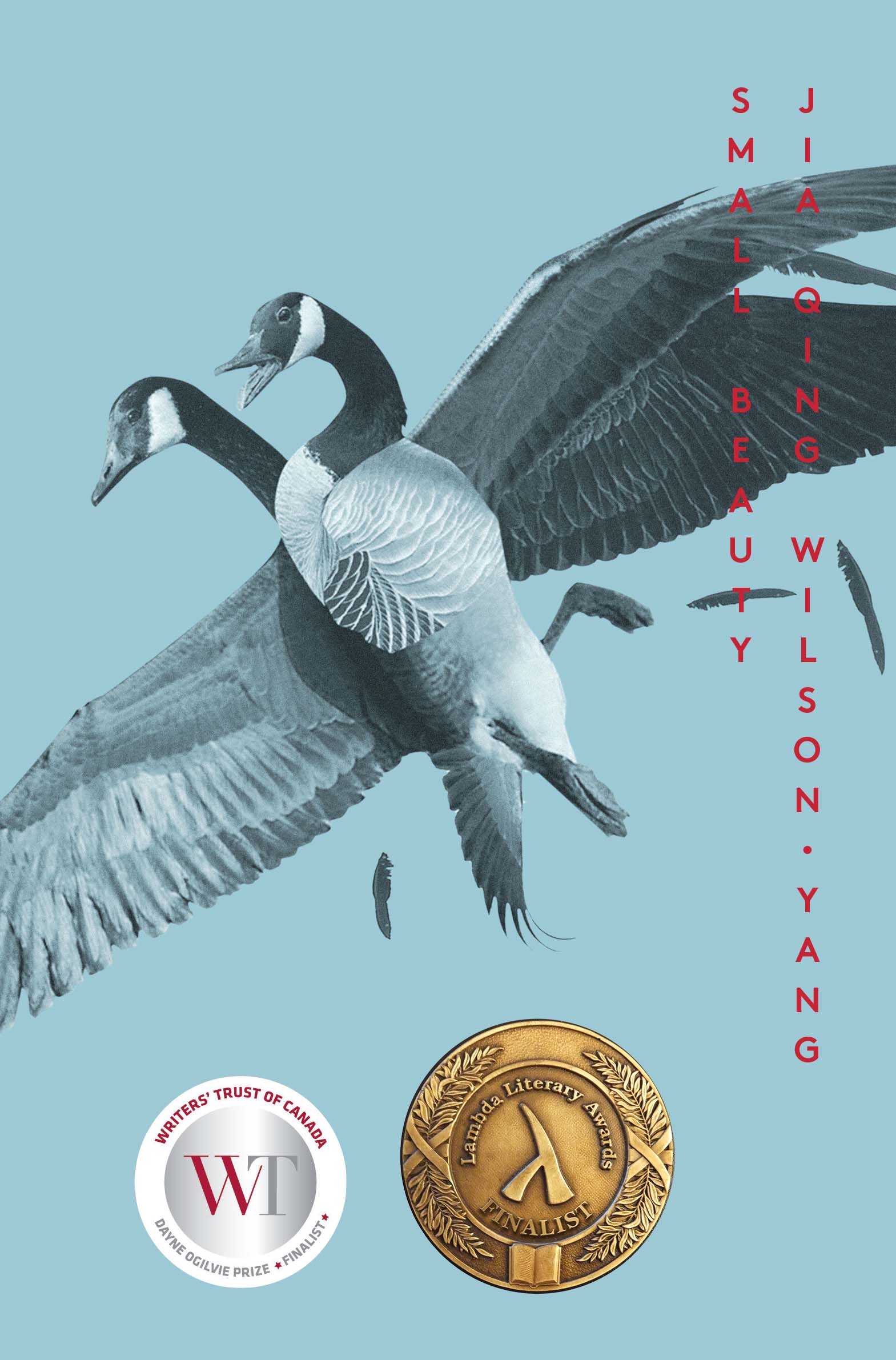
Looking for More from jia qing?
Check out her award-winning book Small Beauty, published by Metonymy Press!
Learn: Native Protocol, by Cathy Grant Gerrior
How can good intentions go wrong, when settlers try to enter into right relationship with Indigenous people? Have you ever been in a group that tried to be supportive, yet somehow ended up with an even more strained relationship than you had before?
Cathy Grant Gerrior, a Mi’kmaq Ceremony Keeper, shared an essay with specific guidance on approaching Native Protocol:
“My hope is to create some … opportunities for discussions to happen between yourselves before you even invite a native person in. I have learned that assuming everyone is on the same page can lead to disaster and then to cultures colliding rather than collaborating.”
She goes on to share concrete ideas and approaches that non-Indigenous people can consider. For example:
Many of us do not consider ourselves Canadian so please don’t assume that we do. Canada was created through racist, violent European imperialism by the dominant society/settlers. We belong to Turtle Island and there are many different territories that are recognized by our people. I believe it is a matter of truth and respect that this be stated one way or another.
As a committee, we’ve been reflecting on this document, especially the section about not introducing ourselves by asking for something, nor expecting that an offered gift will be accepted. “Many ‘gifts’ in the past, well-intentioned or not, did much harm.” You can read the full text of her essay online.
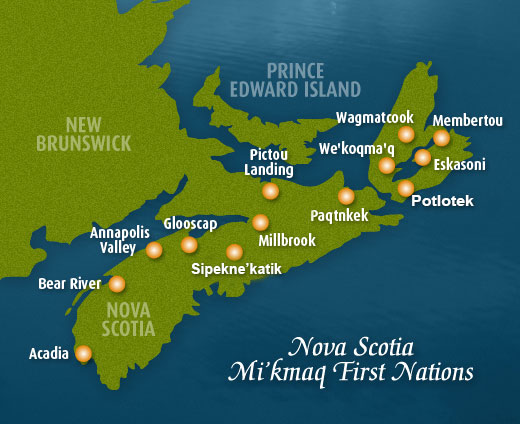
Nova Scotia Mi’kmaq First Nations, from the website of NS Office of Aboriginal Affairs
A Powwow is coming-together of the nation-to-nation relationships that Indigenous Peoples have with each other and with Canada. Non-Indigenous Canadians have a role to play, rather than being spectators, of living into the peace and friendship to which our treaties pledge us. Meeting people, learning about the Indigenous People whose guests we are in Mi’kmaki, and engaging respectfully with Indigenous traditions … all are good reasons to attend a Powwow this summer. Why not choose one and mark it in your calendar now?
Many of the Mi’kmaq communities in Nova Scotia have powwows in the summer; wherever your summer plans take you, there is bound to be one nearby.
You can prepare by reading a couple of different perspectives on protocol: 5 Tips for the First Time You Attend a Powwow may be helpful, as well as Millbrook First Nation’s Powwow Protocol.
TBD……Sipekne’katik Traditional Powwow, Indian Brook, NS

What does the Canada 150 campaign celebrate? Whose perspectives are represented? How does it affect the self-image of those of us who see ourselves as Canadians, and how does it affect relationships between the Indigenous and non-Indigenous people of this land? What are your questions about what this means and what we can do, individually or together?
What Happened?
Short films, radio clips, readings, responses, discussion and reflection.
Light refreshments.
Who Organized?
This event was organized by settlers (non-Indigenous peoples) from Annapolis Valley Quaker Meeting and Horizons Community Development Associates, with support from Acadia University’s Community Development Program, in order to help each other unsettle our thinking about the birth of Canada.
Resource List
Videos
Canada, I Can Cite For You 150 (2:25, Christi Belcourt, 2017)
- Published by Onaman Collective, Feb 3, 2017
Lament for Confederation (6:15, Dan George, 1967)
- “Has Anything Changed? Revisiting Chief Dan George’s Iconic ‘Lament for Confederation’”
- By Janet Rogers, published on CBC.ca, May 5, 2017
What Does Canada 150 Mean for Indigenous Communities? (25:31, CBC, 2017)
- CBC Radio One, The Current, March 16, 2017 interview with Lilian Howard, Christi Belcourt, and Eric Ritskes
Wabanaki People of the Dawn (25:50)
- Part 1 of a 3-part documentary published on the website of NS Office of Aboriginal Affairs
Images
Mi’kmaq History and Map
- Mi’kmaq Spirit (Muin’iskw and Crowfeather)
- We Were Not the Savages (Daniel N. Paul)
Shame and Prejudice: A Story of Resilience (Exhibition by K. Monkman)
In Halifax in October, 2018
- Kent Monkman
- A Trickster With a Cause Crashes Canada’s 150th Birthday Party (The Globe and Mail)
- The Alternative Realism of Kent Monkman (The Walrus)
Peace and Friendship Treaties
Originals at the NS Archives; high-resolution scans are on their website
Alternatives to Canada 150 Logo
Jay Soule’s logos are available on clothing, stickers, etc.
“Colonialism 150” logo products available from Eric Ritskes; proceeds to the Onaman Collective’s Indigenous Tattoo Gathering
- Eric Ritskes: Refusing Canada
- Onaman Gathering From GoFundMe.com, search for “Indigenous Tattoo Gathering”
Documents
United Nations Declaration on the Rights of Indigenous Peoples
Truth and Reconciliation Commission
- “The first stage of the journey of the Truth and Reconciliation Commission of Canada is now complete… But the journey of Truth and Reconciliation is far from over…”
- The National Centre for Truth and Reconciliation documents the Calls to Action, by category and with corresponding actions.
Questioning Canada 150: Event Organizing Collective
Questioning Canada 150 was an event held on June 14, 2017 in Wolfville to discuss and reflect on Canada 150 and the relationship between Indigenous and non-Indigenous peoples. The event was organized by settlers (non-Indigenous peoples) to help us unsettle our thinking about the birth of Canada.
- Horizons Community Development Associates
- Annapolis Valley Quaker Meeting
- Acadia Community Development Program
 We held an evening of discussion and learning on welcoming seekers and Friends of all sexual orientations and gender identities in our faith community.
We held an evening of discussion and learning on welcoming seekers and Friends of all sexual orientations and gender identities in our faith community. Topics
- What does it take to go beyond an intention of acceptance, to an effective welcome? What are the unintentional things that accidentally discourage LGBT2IQ+ seekers, reducing our ability to build the beloved community and weakening our solidarity with each other?
- What are some of the barriers to the full participation of LGBT2IQ+ people in faith communities generally, and Quakers in particular? What can we do to reduce them?
- How can we as a faith community work toward a world without homophobia, transphobia, and related sexualized violence?
- How can this strengthen or weaken our struggles for peace, earth-care, and transformative justice?
Your ideas, concerns, and questions are welcome. There will be opportunities for individual reflection, small-group conversation, and whole-group discussion. If you have never attended a Quaker meeting for worship but you are interested in this topic, please contact us — we would love to hear from you. We can also help organize carpooling if desired. We look forward to seeing you there.
Resources
- Participant Handout
- Assigned Male Comics, a webcomic about gender non-conforming children by Sophie Labelle (NOTE: the facebook page is down as of May 17, 2017 due to a co-ordinated attack by white supremacists who filled it with neo-nazi imagery and death threats, and published her home address online. You can still find Assigned Male Comics on her Tumblr page)
- Women and Honour: Some Notes on Lying, by Adrienne Rich
- Using the F-Word (Fascism), from Shifting Phases
- Maintaining Personal Boundaries in Relationships, by David Richo
- Spiritual Destiny vs. Psychological Task, by David Richo
- Sex, Gender, and Mental Health: with a history of 2SLGBTQ+ social control
- The Lie of Entitlement, by Terrence Crowley
- A Developmental Model of Intercultural Sensitivity, by Milton J. Bennett (see also Summary Poster)
- Excerpt on “Accountable Communities” from The Revolution Starts at Home (Chen, Peipzna-Samarasinha eds.)
Decolonization and Land Acknowledgements
One of our favourite resources is a 2016 interview with Anishinaabe comedian and writer Ryan McMahon. In this 7-minute segment on CBC’s “The 180”, McMahon talks about the relationship between decolonization and reconciliation, how well-intentioned kindness can distract us from hard questions about land, and why land acknowledgements are a bit like telling someone you stole their truck.






 Breastfeeding Friendly Organization
Breastfeeding Friendly Organization